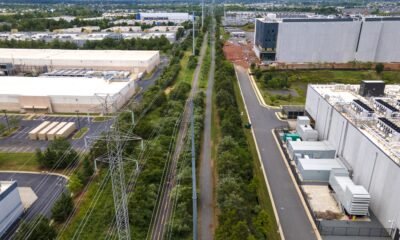Tools & Platforms
Gorilla Technology Secures AI Government Intelligence Platform Win in Asia

Solidifies position as prime vendor for AI-based Internet Protocol Detail Record analytics in the APAC region
September 08, 2025 9:15 AM EDT | Source: Gorilla Technology Group Inc.
London, United Kingdom–(Newsfile Corp. – September 8, 2025) – Gorilla Technology Group Inc. (NASDAQ: GRRR) (“Gorilla” or the “Company”), a global solution provider in Security Intelligence, Network Intelligence, Business Intelligence and IoT technology, today announced it has secured another major government win in APAC this year, reinforcing its position as the region’s trusted partner for AI-powered law enforcement modernisation and sovereign intelligence infrastructure. This newly awarded one-year contract is valued in the tens of millions of dollars and will enable AI-first smart policing GPU-as-a-Service for one of Asia’s most advanced national investigative bureaus responsible for high-level cybercrime and digital intelligence investigations.
Building on the momentum of its recent 5G AI Lawful Interception platform win, this project marks Gorilla’s second consecutive AI-led national enforcement deployment in 2025 alone and appoints Gorilla the prime vendor for ground-breaking AI-based IPDR (Internet Protocol Detail Record) analytics in the APAC region.
“Gorilla is delivering mission-critical security and intelligence systems to forward-thinking regions,” said Jay Chandan, Chairman and CEO of Gorilla Technology. “We have positioned Gorilla as a foundational AI partner in the APAC region, and we are building a strong track record in advancing AI-first national platforms across smart policing, GPU-as-a-Service data centres, cross-border intelligence, and digital forensics. As this is our second win in a fortnight, it is clear we are dominating the AI infrastructure market opportunity in APAC. This is what leadership in applied AI looks like and we are just beginning.”
The system is designed to enable national, investigative agencies to retrieve and reconstruct historical network traffic using advanced AI models-capabilities that were previously unattainable in the region’s cybercrime enforcement landscape. Gorilla will lead the delivery effort in collaboration with regional partners to ensure rapid execution and long-term scalability. Gorilla will also be focusing on AI compute scale-up, edge-cloud federation, and national model training capabilities.
The platform will deploy Gorilla’s proprietary AI inference engines, enabling authorities to mine historical digital footprints, reconstruct communication chains and identify anomalous behaviours across petabytes of network metadata. Designed for real-time decision support and post-incident forensics, the solution puts Gorilla at the heart of national cyber-resilience efforts across Asia.
“Governments across the region are no longer looking for point solutions. They are looking for long-term AI partners who can deliver scale speed and sovereign control,” said Jackie Wang, Gorilla Technology General Manager, ASIA (ex. India). “This win proves our strategy is working. That is exactly what Gorilla offers.”
Gorilla is positioned to become the market leader for AI-powered public safety and enforcement across Asia, please find more information on previously announced agreements, partnerships, and corporate milestones in the “Press Releases” section of the Company’s website, here.
About Gorilla Technology Group Inc.
Headquartered in London U.K., Gorilla is a global solution provider in Security Intelligence, Network Intelligence, Business Intelligence and IoT technology. We provide a wide range of solutions, including Smart City, Network, Video, Security Convergence and IoT, across select verticals of Government & Public Services, Manufacturing, Telecom, Retail, Transportation & Logistics, Healthcare and Education, by using AI and Deep Learning Technologies.
Our expertise lies in revolutionizing urban operations, bolstering security and enhancing resilience. We deliver pioneering products that harness the power of AI in intelligent video surveillance, facial recognition, license plate recognition, edge computing, post-event analytics and advanced cybersecurity technologies. By integrating these AI-driven technologies, we empower Smart Cities to enhance efficiency, safety and cybersecurity measures, ultimately improving the quality of life for residents.
For more information, please visit our website: Gorilla-Technology.com.
Forward-Looking Statements
This press release contains “forward-looking statements” within the meaning of the “safe harbor” provisions of the Private Securities Litigation Reform Act of 1995. Gorilla’s actual results may differ from its expectations, estimates and projections and consequently, you should not rely on these forward-looking statements as predictions of future events. Words such as “expect,” “estimate,” “project,” “budget,” “forecast,” “anticipate,” “intend,” “plan,” “may,” “will,” “could,” “should,” “believes,” “predicts,” “potential,” “might” and “continues,” and similar expressions are intended to identify such forward-looking statements. These forward-looking statements include, without limitation, statements regarding our beliefs about future revenues, our ability to convert our pipeline, our ability to and the circumstances under which we would reduce our debt, our ability to attract the attention of customers and investors alike, our expansion into southeast Asia, Gorilla’s largest projects and ability to win additional projects and execute definitive contracts related thereto, along with those other risks described under the heading “Risk Factors” in the Form 20-F Gorilla filed with the Securities and Exchange Commission (the “SEC”) on April 30, 2025 and those that are included in any of Gorilla’s future filings with the SEC. These forward-looking statements involve significant risks and uncertainties that could cause actual results to differ materially from expected results. Most of these factors are outside of the control of Gorilla and are difficult to predict. Should one or more of these risks or uncertainties materialize, or should underlying assumptions prove incorrect, actual results may vary materially from those indicated or anticipated by such forward-looking statements. Readers are cautioned not to place undue reliance upon any forward-looking statements, which speak only as of the date made. Gorilla undertakes no obligation to update forward-looking statements to reflect events or circumstances after the date they were made except as required by law or applicable regulation.
To view the source version of this press release, please visit https://www.newsfilecorp.com/release/265500

Tools & Platforms
AI being used to enhanced learning. Is it dumbing us down?

The use of artificial intelligence has allowed us to rely more on technology for almost everything. But with that, is AI dumbing us down? Are we able to think critically?
A new study from MIT discussed a new problem called “metacognitive laziness” and how there is a red flag being raised in schools to embed AI tools into the classroom.
“Tell me about the history of the telegraph in the United States. We’re building on tools that allow people to come to their own models, at their own knowledge,” said Steve Schneider, an information design and technology professor in the new artificial intelligence exploration center at SUNY Polytechnic Institute.
“I think AI is a tool that unlocks human potential and capabilities and opportunities to advance knowledge and advance society,” said Schneider.
So, when it comes to AI, is it a cheat code for students or can it enhance their learning?
“Some faculty are really worried about students using generative AI to essentially replace their own judgment or their own learning,” said Andrew Russell, the provost and vice president of academic affairs at SUNY Polytechnic Institute. He says it’s important for students to use AI — but the right way.
“Know its capabilities, know its limits and have a sense of when it’s good to apply it and perhaps when they should use something else because they’re going to need to use it when they get out into the world and work in jobs and graduate school after they graduate,” said Russell.
One thing they’re doing in the artificial intelligence exploration center is building new applications for people to access AI.
“And what we’re learning and trying to understand is how do people experience artificial intelligence,” said Schneider.
In class, students will be given a prompt with questions that they can chat into Gemini, Google’s AI model.
“What does it mean to you to think? What happens when you think? And ask them a couple of questions about thinking in cognition. After the students answer them with Gemini, Gemini will flip the script and say, OK, now you ask me questions about how I think and how I learn,” said Schneider.
The Gemini model will then produce a summary of the conversation. Students will then be directed to save that transcript.
“So we take all the 20 or 25 transcripts we get, we’re going to upload that to a large language model, that will generate basically a 10 or 12-minute podcast, audio text that summarizes all of the work that the students did,” said Schneider.
Schneider says this is how AI is allowing students to expand their capabilities.
Tools & Platforms
Top Wall Street Analysts Back These Three AI-Powered Tech Stocks

TLDR
- Broadcom secured a $10 billion customer deal and expects AI revenue to reach $45 billion in fiscal 2026
- Zscaler delivered strong Q4 results with 31% growth in remaining performance obligations for fourth consecutive quarter
- Oracle reported 359% year-over-year growth in remaining performance obligations to $455 billion
- JPMorgan raised Broadcom’s price target to $400, Stifel boosted Zscaler to $330, and Jefferies increased Oracle to $360
- All three companies show strong AI-driven growth with analysts maintaining buy ratings
Wall Street’s top analysts are betting on three technology companies positioned to benefit from artificial intelligence growth. Broadcom, Zscaler, and Oracle all received upgraded price targets from leading analysts following strong earnings results.
Broadcom reported impressive third-quarter results and secured a new $10 billion customer deal. The semiconductor company’s AI revenue grew 18% sequentially in Q3 and is expected to reach $6.2 billion in the fourth quarter.
JPMorgan analyst Harlan Sur raised his price target for Broadcom to $400 from $325. Sur believes the company will deliver about $20 billion in AI revenue for fiscal 2025.
The analyst expects AI revenue to jump 125% to $45 billion in fiscal 2026. This growth comes from Broadcom’s custom AI chips that offer better efficiency and economics than competitors.
Zscaler Shows Strong Zero Trust Demand
Zscaler delivered solid fourth-quarter results driven by demand for Zero Trust and AI security solutions. The cybersecurity company’s remaining performance obligations grew 31% for the fourth consecutive quarter.

Stifel analyst Adam Borg increased his price target to $330 from $295. Borg praised the company’s strong execution across key metrics including billings growth.
The analyst remains positive about Zscaler’s newer solutions like Z-Flex. He believes the company’s portfolio helps organizations improve security while reducing costs through vendor consolidation.
Borg expects Zscaler to maintain high-teens revenue growth in coming years. The company continues expanding its Zero Trust offerings into emerging areas like AI security.
Oracle’s Cloud Contracts Drive Massive Growth
Oracle saw its stock surge after reporting 359% year-over-year growth in remaining performance obligations. The database company reached $455 billion in contracted revenue despite missing Q1 earnings estimates.

Jefferies analyst Brent Thill boosted his price target to $360 from $270. Thill called the RPO results the highlight of Oracle’s quarter.
Oracle added $317 billion in RPO during the quarter from four multi-billion-dollar contracts. This represents nearly five times the company’s estimated fiscal 2026 total revenue of $67 billion.
The Oracle Cloud Infrastructure business is expected to grow 77% to $18 billion in fiscal 2026. Management projects this will jump to $144 billion by fiscal 2030.
Oracle plans to expand to 71 data centers across cloud providers. The company expects multicloud database revenue to grow every quarter for several years.
All three analysts maintain buy ratings on their respective stocks. Sur ranks 39th among over 10,000 analysts tracked by TipRanks with a 67% success rate and 26.1% average return.
Tools & Platforms
Seattle launches new AI plan with hackathons, training, and expanded city services

Seattle Mayor Bruce Harrell on Thursday announced the city’s 2025-2026 Artificial Intelligence Plan, a sweeping initiative that expands on earlier work and aims to position Seattle as a national leader in responsible AI use.
The plan combines updated policies, citywide training, new tools, and a series of public hackathons to encourage innovation.
“Artificial intelligence is more than just a buzzword in Seattle – it’s a powerful tool we are harnessing to build a better city for all,” Harrell said in a statement. “Our new plan ensures we lead with our values, using AI to improve services, empower employees, and speed up processes like permitting.”
Seattle was one of the first U.S. cities to release a generative AI policy in 2023.
The updated plan broadens those principles—innovation, accountability, fairness, privacy, explainability, and security—beyond generative AI to cover all forms of artificial intelligence.
The city is launching new training programs for employees, starting with an introductory course for all staff.
Advanced workshops will cover data science, data integration, and other technical skills, while partnerships with universities and technology companies will provide specialized curricula.
Seattle is also working with labor groups to ensure workers’ rights are protected while services become more efficient.
The city has already tested about 40 AI projects. The new plan shifts focus to applying lessons learned in key areas:
-
Permitting: A pilot with CivCheck is designed to cut application times in half by identifying errors before permits are submitted. Progress will be posted on a public website.
-
Transportation: AI helps Seattle Department of Transportation spot dangerous intersections for safety upgrades. The city also partners with King County Metro to improve bus reliability and with Lime to better manage bike and scooter parking.
-
Infrastructure: Seattle Public Utilities is exploring AI for pipe inspections to catch problems early and protect public health. AI is also being tested for HR support and purchasing.
-
Communication: Tools such as Jasper and Smartcat are being used to draft accessible materials and provide accurate translations with human review, following Harrell’s February executive order on inclusive information.
A new AI leadership role will be added to the city’s IT department to coordinate efforts.
Seattle is also working with partners including Stanford’s Regulation Lab and the Rockefeller Foundation to explore chatbots, digital assistants, and custom-built AI agents.
The city is partnering with AI House to host the Community Innovation Hackathon Series, bringing together students, technologists, entrepreneurs, and community members to design AI-powered solutions to civic challenges.
The first event, held September 11, focused on enhancing the city’s Youth Connector app, which links young people to mental health and enrichment programs. Future hackathons will address permitting, customer service, and small business support.
“Partnering is absolutely the key to success,” said Rob Lloyd, Seattle’s chief technology officer. “In true Seattle style, we’re partnering with AI House to launch the Community Innovation Hackathon Series that invites Seattleites to help us turn responsible AI into practical solutions.”
Nearly one-quarter of the nation’s AI engineers work in Seattle, second only to San Francisco.
With institutions like the University of Washington, a robust tech ecosystem, and public-private partnerships such as AI House, the city is positioning itself as a national hub for AI development.
City leaders say the new plan will help ensure growth aligns with public values while accelerating housing production, improving safety, and making services more accessible.
As Harrell put it, “By using this technology intentionally and responsibly, we are fostering a nation-leading AI economy, creating jobs and opportunities for our residents, while making progress on creating a more innovative, equitable, and efficient future for everyone.”
-

 Business2 weeks ago
Business2 weeks agoThe Guardian view on Trump and the Fed: independence is no substitute for accountability | Editorial
-
Tools & Platforms1 month ago
Building Trust in Military AI Starts with Opening the Black Box – War on the Rocks
-

 Ethics & Policy2 months ago
Ethics & Policy2 months agoSDAIA Supports Saudi Arabia’s Leadership in Shaping Global AI Ethics, Policy, and Research – وكالة الأنباء السعودية
-

 Events & Conferences4 months ago
Events & Conferences4 months agoJourney to 1000 models: Scaling Instagram’s recommendation system
-

 Jobs & Careers3 months ago
Jobs & Careers3 months agoMumbai-based Perplexity Alternative Has 60k+ Users Without Funding
-

 Podcasts & Talks2 months ago
Podcasts & Talks2 months agoHappy 4th of July! 🎆 Made with Veo 3 in Gemini
-

 Education3 months ago
Education3 months agoVEX Robotics launches AI-powered classroom robotics system
-

 Education2 months ago
Education2 months agoMacron says UK and France have duty to tackle illegal migration ‘with humanity, solidarity and firmness’ – UK politics live | Politics
-

 Podcasts & Talks2 months ago
Podcasts & Talks2 months agoOpenAI 🤝 @teamganassi
-

 Funding & Business3 months ago
Funding & Business3 months agoKayak and Expedia race to build AI travel agents that turn social posts into itineraries












